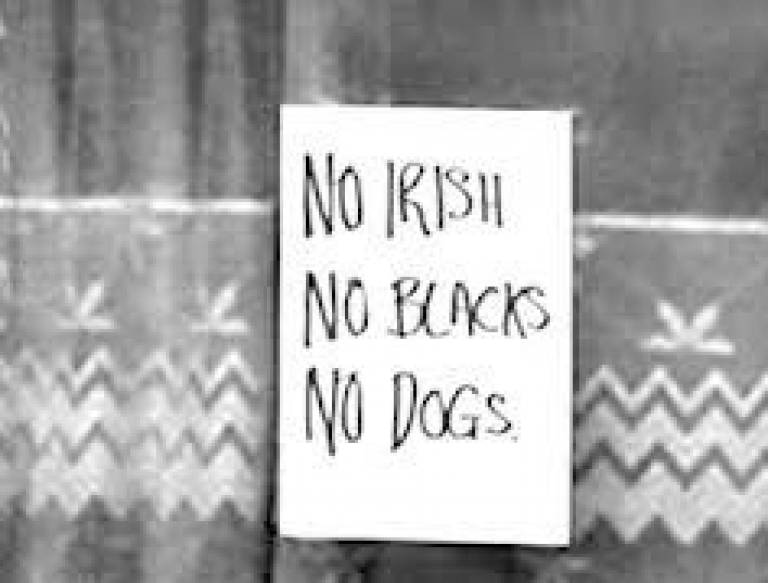Fathers, Sons, and Grandfathers: Migration Across Generations
9 September 2015
Through the stories of three generations in thirty families, Julia Brannen explores men's lives, migration, employment, fatherhood, father-son relationships over the life-course.

Being a migrant is a process and not simply a status. Migrants are more than cheap labour; they also have family lives. Fathers and Sons: Generations, Families and Migration (published in July 2015 by Palgrave Macmillan) is based on an Economic and Social Research Council study of fatherhood in three generations of men: grandfathers, fathers and sons conducted at the UCL Institute of Education in 2009-12. It includes Irish grandfathers who migrated to Britain in the mid 1900s and Polish fathers who came to the UK in the 2000s as well as white British fathers.
Lives change over time and how migrants view their lives changes also. On the one hand, the lives of these migrants were tough: the Irish and the Polish men worked in manual jobs in the UK, many in the harsh, precarious and dangerous conditions of the construction industry. On the other hand, both groups looked back on their lives as successful. These stories challenge the popular view that migration is problematic and necessarily a social problem and bear witness to the significant contribution that migration brings to a society over the long term.
The Irish grandfathers who remained in the same industry for the rest of their working lives measured their success in traditional terms: being ‘good providers’ for their families, maintaining continuous employment and never relying on benefits, and buying their own homes. Most of all they set store by the success of their children. Indeed upward occupational mobility is the legacy that the Irish grandfathers passed on to the Irish second generation, success also assisted by selective religious schooling and strong mothering.
In keeping with these stories of success and looking back over 50 or more years in Britain, the Irish grandfathers played down the hostility with which they were met individually in the 1950s, while still recalling the notices in boarding house windows – ‘No Irish, no Blacks, no dogs’. Such discrimination was meted out to others, they said, but not to themselves. Memories of hard times were instead reserved for their childhoods and youth growing up in Ireland that remained impoverished and rural following the country’s struggle for Independence.
So too the Polish fathers, looking back across a shorter time frame, stressed their achievements as migrants in the face of the many difficulties as they struggled with the English language and with finding work, affordable housing and good Roman Catholic schools for their children. But because their migration was more recent, they were more mindful of and less reticent about being discriminated against than the Irish.
Unlike the Irish, who perhaps saw migration as final because of its distance, the Poles viewed migration as a temporary phase. Their memories of their lives in Poland were recent because of constant contact with their extended families enabled by the technologies of Skype and mobile phones, and because of cheap air travel that allowed them to visit Poland frequently. As one father put it as he considered whether and when his family would return to Poland, they were ‘hanging in the present’, adopting ‘a wait and see’ perspective.
These fathers had an additional resource. Unlike the Irish who came to Britain with only rudimentary education, most Polish fathers had received post-school education of some kind, a legacy of the old socialist system. Therefore they had skills to return home with. They were also concerned about their children’s future in Britain and aspirational for them, in particular weighing up the educational opportunities in Britain (fear was expressed about the high university tuition fees) as compared with those in Poland. Moreover, because their qualifications far exceeded those required for the manual work in which they were employed in Britain, they kept a watchful eye on Poland’s growing economy.
In addition, unlike the Irish whose native land has had a long, close and fraught relationship with Britain over several hundred years, the Poles’ relationship to Britain was less complex. One of their main responsibilities as fathers they said was to ensure their children kept their Polish identities by taking them to Polish language classes, cultural and religious activities.
As the worst refugee crisis since the Second World War unfolds across continents, we should be mindful of the migrant generations that have gone before and the ways in which they are woven into and enriched by the societies they join. Most families have a migration of one kind or another.
Julia Brannen is Professor of the Sociology of the Family, at the UCL Institute of Education.
Fathers and Sons: Generations, Families and Migration will be launched on Tuesday, 15 September, 17:00 to 19:00 , at the Thomas Coram Research Unit Library, 27-28 Woburn Square, London WC1H 0AA.
For more information contact tcru@ioe.ac.uk
 Close
Close

